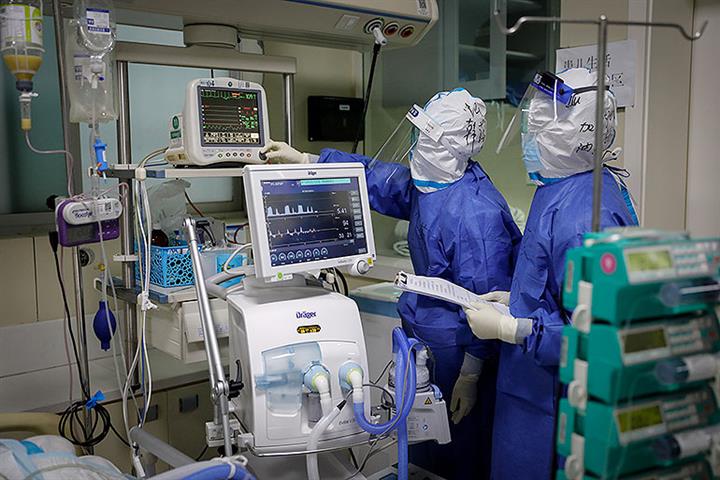 Chinese Medical Device Makers Miss Boat on EMCO Life Support Machines as Demand Soars in Pandemic
Chinese Medical Device Makers Miss Boat on EMCO Life Support Machines as Demand Soars in Pandemic(Yicai Global) Oct. 19 -- Chinese medical device manufacturers need to upgrade their products to respond to the surging demand for life support machines that replace the function of the heart and lungs amid the Covid-19 pandemic.
"The pandemic has made extracorporeal membrane oxygenation machines a hit," Guo Kai, a salesperson at an ECMO machine company, said to Yicai Global.
"I have been a sales agent for more than 30 years, and ECMO machines have never been selling as well as now," said Guo. Major hospitals in provincial capitals and large cities across the country are behind the surge in demand.
The firm has received orders for hundreds of such life support machines from dozens of domestic hospitals since last year when the Covid-19 pandemic began spreading quickly. "They need to wait for half a year for the delivery if they order now."
As expected, prices are rising. A complete ECMO machine, along with the relevant consumables, is sold at around CNY2 million (USD312,620), up from the earlier CNY1.2 million, according to the sales agent. The prices are increasing amid stronger demand and stockpiling amid new coronavirus outbreaks, Guo explained.
The inquiries also involve related consumables such as circuit tubing. Guo said that his phone is ringing frequently as doctors are asking about delivery times.
"The manufacturer sends me more than 10 sets of consumables from overseas every month, but it is not enough,” said the agent. Each ECMO device generally needs one set of consumables under normal circumstances. But Covid-19 has changed that concept.
Out of Stock
Doctors are resorting to domestic products amid the shortages.
Certain ECMO consumables have been out of stock since the beginning of the year, said the chief physician of an intensive care unit inside a large public hospital in southern China. Particularly, the hospital has been lacking two types of core products for a long time.
The facility has been using domestically manufactured products as those are better than nothing even though these products' performance is not as good as that of imported ones, according to the chief physician.
The pandemic has caused the market to overheat. Having an ECMO machine is becoming a status symbol for hospitals as these devices can buy some time for critically ill patients. But some hospitals are making these purchasing decisions without paying enough attention to the resulting utilization rate, according to the same physician.
Only about 20 patients need to use an ECMO machine per year, whereas this particular hospital's ICU department treats from 1,500 to 1,600 people during that time. That is a low ratio, said the same person.
Another large public hospital, which has several ECMO machines, uses them less than 100 times per year, according to a doctor in charge of cardiovascular surgery at the institution.
Guo acknowledges the problem. Many hospitals use the machine only once or twice per year after the purchase, he said. "They are sitting there like some piece of decoration."
Catching Up
Most ECMO products at big hospitals in China are imported. Germany’s Maquet controls more than 60 percent of the market share, but other major sellers include Italy's Sorin Group, and American-Irish Medtronic.
The biggest development bottleneck is the quality of consumables, a doctor with more than 10 years of ECMO treatment experience said to Yicai Global. At least five domestic companies are developing ECMO devices and have made good progress, but they have not yet launched core consumables.
For example, a product made by Maquet can be used for more than 10 days or even dozens of days, but those of others may need to be replaced every one or two days, said the above-mentioned chief physician. And frequent replacement is extremely risky for patients, the medical expert added.
One of the needed consumables is a heat exchanger. But domestically produced items to control patients' body temperature are too large and thus take up too much space in the emergency room, said Guo.
When technological development eventually catches up, it takes time to gain trust. The chief physician demonstrated this point. “Considering safety and stability, we still tend to drive gas-powered vehicles that have been proven functional through years of experience, rather than new electric vehicles.”
Editor: Emmi Laine, Xiao Yi